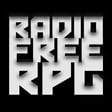Become a Creator today!Start creating today - Share your story with the world!
Start for free
00:00:00
00:00:01

Episode 8: Counter-Culture, RPGs, and DIY with Gavriel Quiroga
Join Host Alan Bahr as he chats with Argentinian RPG creator and publisher Gavriel Quiroga about Gavriel's games, including the recently released Hell Knight. They delve into what makes Gavriel's games unique, his creative process, and how Gavriel approaches the idea of RPGs.
https://gavrielquiroga.wordpress.com
Transcript
Introduction to Radio Free RPG
00:00:10
Speaker
I'm Alan Barr and this is Radio Free RPG. Hello, I'm Alan Barr and welcome to Radio Free RPG.
Meet Gabriel Quidota, RPG Designer
00:00:32
Speaker
Today I am joined by my guest, Gabriel Quidota, and I'm completely mispronouncing that last name, and I apologize. We tried like five times, I am not getting it. Don't worry about it, you did it perfectly. I doubt that, but thank you for being so kind.
00:00:49
Speaker
Gabriel is a RPG industry writer, designer, publisher. He does layout, art direction, all over the board with his skill set. And he is coming to us from the Southern Hemisphere. Yes, from Argentina. What part of Argentina? Buenos Aires, about one hour from downtown. Okay, wonderful.
00:01:18
Speaker
I assume the weather down there is better than up here where I am. Yes, I'm sure it's a hot summer. No, not summer. We are entering autumn now. Well, it is winter here and we are below freezing today with several feet of snow outside. Lovely, lovely. I like it. It's lovely until you have to shovel your driveway. Yes, I imagine. So, Gabrielle, let's talk about your games. What would you say you are known for?
Gabriel's Game Design Journey
00:01:50
Speaker
And I have only three RPGs at the moment produced. And I guess that all of them have some importance were very important. And I knew what city in this case was the one that opened my career as a game designer.
00:02:14
Speaker
So I can say that that work is very personal and very important in that way. And then came Warplan, which is like a dark, psychedelic fantasy in Fireball Hey Metal comics. And then we have Hell Knight. That's like my Doom Biker RPG.
00:02:39
Speaker
And I couldn't say which one is more important or which one is more relevant to me. It's quite even with that. Sure. They're all equally important because they are all steps in your path, right?
00:02:58
Speaker
Yes, because I think I could reach the moment where I'm satisfied with it and I could publish it and I can still look back and see some mistakes or some things that can be corrected. That's why I'm launching a new updated edition of NeuroCity. But I'm really very happy with them and I think that they provide a sort of unique or original experience.
00:03:29
Speaker
I would agree. They're fantastic pieces of work. I have them all on my shelf, except for Hell Knight, which is fulfilling now from Exalted. Yes, I'm very excited to get that one as well.
Punk-Inspired RPG Styles
00:03:43
Speaker
With your RPGs, they have a very distinct style of presentation and attitude about them. One that might be compared to the early punk scene or that counterculture
00:04:02
Speaker
Vibe of the subversive seventies and eighties in a lot of ways the heavy metal era maybe if we were to draw a common parallel for the English speaking audience. What brings you to that that presentation that ethos.
00:04:23
Speaker
I think that is a confluence of aesthetic and game design choices. I think that nostalgia is also a big part of our culture.
00:04:44
Speaker
I guess that at least for me, that 80s era was the one that nurtured me a lot since my childhood. Okay.
00:04:59
Speaker
So I guess that had a very strong impact on me. And whenever I see artists from that era or books from that era cover arts, I think that it stands out the difference, maybe quality or essence. I don't know, there's something different about all that. Maybe it has to do with the techniques used or maybe it had to do with
00:05:26
Speaker
the spirit of those times, I guess it's a bit difficult to grasp why. But anyway, I think that when I developed those settings, I had to look for an angle to tackle the visual aspects of each book. So I think that it made sense for neurosity
00:05:56
Speaker
to like, to concentrate on looking like the IY Cine, I'm not sure if I pronounced it correctly. Or maybe like, like a manual codebook or something like that.
00:06:16
Speaker
Also, I think that a very big inspiration on that book, for example, was 1984, so exactly that era. So you had, it made a lot of sense to set a neurosurgical example in the 80s. And in the case of war crime, again, with the Hey Metal magazine, again, it made a lot of sense to use all the visual plethora of the Hey Metal magazines and the
00:06:50
Speaker
And all those guys that had their own palette of colors and tried to use that palette for the break.
00:06:58
Speaker
So it was very easy to like take that and use it for another thing. That's what I usually do. In the case of Hell Knight again, I could do that with the 80s horror movies or 80s horror B movies. And also the album cover arts for Hey Metal that are very distinct and they have their own individual colors and stuff.
00:07:30
Speaker
All of your books are fantastic in that they all have a very distinct and different visual style. You can put them side by side and you can recognize them all as works by you, both in the pros and sort of the visuals, but they also all stand very apart in terms of genre and presentation.
00:07:53
Speaker
Oh, that's great. That's the way that I managed to do that. Honestly, I wouldn't know. Because to me, the aesthetics, I don't feel that they are mine. It's like I'm just taking something that belongs to someone else and using it. But it's a way that I can be recognized through my works.
00:08:15
Speaker
Art is about trying to evoke an emotional response and your works do a very good job of finding that emotional response that I feel you as the designer and the creator were looking for and then being able to evoke that exact response.
00:08:32
Speaker
I suspect when I read Hell Knight for the first time, it made me feel very much like you wanted me to feel. Like I was watching movies like The Crow or some of those earlier... What's the John Carpenter one with the motorcycles I've forgotten now? Evil Dead? Well, Evil Dead. But the John Carpenter, were there the knights on the motorcycles?
80s Influences in Gabriel's Work
00:09:00
Speaker
John Carpenter and motorcycles. Oh, what was it now? I'm going to. I think it was boys, but it made it reminded me very much of those 80s demonic horror movies, kind of the B movies with special effects that were more splatter gore, perhaps, or a little. It's ironic that I think that
00:09:27
Speaker
To be honest, I have always been fascinated by that whole theme, but it's ironic that the awakening, the spark was caused exactly by Mandy from Panos Cosmatos. It makes a lot of sense because that movie and all of Panos Cosmatos works is exactly about the maybe 70s and 80s era, all that
00:09:57
Speaker
analog retro-futuristic thing that he has going on. Not only with Mandy, but also with Beyond the Black Rainbow. Okay. I love Beyond the Black Rainbow. It's a fantastic movie. Yes. So what has been the reason you decided to start making RPGs?
Passion for RPGs: From Dungeon Master to Designer
00:10:28
Speaker
To be honest, I have always been making RPGs. I think that as soon as I learned what it was, as soon as I became a dungeon master that happened fairly quickly because we were all moves in my game group, I started using my own stuff with all the settings.
00:10:54
Speaker
So I never stopped making games. Maybe I stopped even playing them, but I never stopped developing. That might be weird, but it did happen. So when the project started, I had neurosity written in Spanish. I had the idea of translating it.
00:11:23
Speaker
launching the Kickstarter. I found that there was a way for me to make a living out of that. Okay. And is making games your full-time job? Yes, it is at the moment. It's a struggle, but I can somehow manage. If it helps you feel better, it's very hard here too.
00:11:50
Speaker
Yeah, I know. It's hard as a basis. Yes, it's very difficult. So with these games and the distinct attitude you bring to them, you are also very much a proponent of older forms of entertainment. I see you post about things like Cathode TV.
00:12:16
Speaker
Yes. What draws you to those sort of ideas as well? I guess that if you can grow beyond nostalgia, it's something very important in itself. I think that what appeals me a lot is the independent creations of art.
00:12:41
Speaker
art being created by a person with passion, maybe with not enough money, but yes, with great ideas and a lot of energy to do it. So that creates a piece that has its own force.
00:13:04
Speaker
it like carries your way and it can really inspire other people to do the same. And that goes with the DIY culture or the independent cinema, independent whatever. And I think that right now there is like a sort of opposition to what could be considered as corporate products, maybe corporate cinema, corporate,
00:13:34
Speaker
music or whatever, and you can either go that way or you can go the other way. The other way would be the underground culture, right? And I think that it's great. I think that there's even a revival of that. I at least feel it. It's very cool when you see hidden gems of movies, of independent movies, of big movies.
00:14:04
Speaker
And maybe they are, they are lost. They could be lost in, in oblivion. If it weren't by these curators like Catho TV or, or people that rescue them from, from oblivion and push them by, take them to an audience and the audience can appreciate it and it revives and it brings back that, that feeling. It's a, I think it's cool. It's really amazing. Right.
00:14:30
Speaker
There are a lot of companies bringing back those revivals. You have Vinaigro Syndrome and then Syndrome Films has recently re-released the Tombs of the Blind Dead, the Spanish Templar horror movies. Criterion Collection obviously is well known for their attempts to preserve art. We don't have an equivalent entity in
00:14:56
Speaker
tabletop role-playing games. The closest we would have would be the sort of historical artifact print-on-demand from Drive-Thru RPG of classic D&D books or old Chaosium products.
RPGs in 1990s Argentina
00:15:10
Speaker
Do you think we are at risk of losing pieces of RPG history? I wouldn't be able to say that because being in this country,
00:15:24
Speaker
To me, it was very difficult to find RPGs in the 90s. So I am very ignorant of the history of RPGs. It appeals me a lot. I am very interested in them because I do a lot of research. But I don't know them that much, to be honest. In Buenos Aires, it was like I had to move
00:15:52
Speaker
I had to maybe travel one hour to find a bookstore that I know that I had the core book of the second edition of D&D. It was very difficult in those times. So we didn't have any access at all to more obscure products or independent products even. The only thing I had when internet came, I remember in those times it was
00:16:20
Speaker
It was a French webpage that's called Le Chidro that talked about our drag on lands or stuff like that. And we translated it into Spanish to understand what's going on because we didn't have a way to be informed about all this. Sure.
00:16:41
Speaker
So what RPGs from the history of RPGs interest you? You said you're trying to always learn more to reach back into that. What do you find influential on you when you do that?
Influential RPGs: Dark Sun and Kult
00:16:55
Speaker
Well, I like a lot, for example, Dark Sun. To me, Dark Sun, the brutality and that whole thing over the top thing, I think it was great.
00:17:09
Speaker
a war plan, in fact, is very heavily inspired in dark sun. Yeah, I like that it had a strange things like, I remember that many, many wildlife have like psionics powers, and mental powers, no, in dark sun. Yes. So it was like, it's everything was weird and different. And it went away from traditional fantasy.
00:17:38
Speaker
And then we have a, I like planescape, I know those settings were really cool. And then when I got my hands in with a cult, the road playing game, to me it was like a big opening that moved totally away from fantasy itself because when cult, what is it? What genre is it?
00:18:05
Speaker
I believe the original cult came out in the late eighties, early nineties out of Sweden. Yeah. But what was the general, it's a horror horror. Metaphysically. Gnostic horror. Yes. Yeah. And that was heavily influential on me. I love it. That whole Gnostic stuff. I also like, um,
00:18:31
Speaker
the Forbidden Zone and the Twilight Zone. And so I felt related to that. I really enjoy it. Yeah.
00:18:46
Speaker
The first time I read Cult, it was a revelation to me in terms of presentation and theme and ideas. And I find it very influential today on how I view horror role-playing games. Absolutely. I think that it's a great read and it's very evocative. I think that it must be very challenging to master it, to DM it, right?
00:19:14
Speaker
not that easy because you don't have the, I think that some games don't have the practicality or don't have it easy because they don't have the party concept, the concept of a group of people that, you know, for example, the fantasy, you have a group of adventurers that gather together in a tavern and
00:19:40
Speaker
Uh, that's fairly easily. And it's like a common plot line in, in the setting. Like it happens. You can even meet other people doing it or other NPCs doing that, you know, but maybe in cold, you have to, you need to find out. You need to really think about and find a reason for them to be together. And all of them will have their own motives and maybe they will separate and it's, it must be challenging.
00:20:08
Speaker
Yes, as somebody who has ran it, it is a lot of work on the GM. Yeah.
Creative Process and Inspirations
00:20:15
Speaker
So what does your day-to-day creative process look like? It's quite random, but quite demanding, and profound, and constant, and relentless. Now, I try to, for example,
00:20:37
Speaker
When I know I have to work on something,
00:20:40
Speaker
For example, Hell Knight, what I did was try to listen to the music that evoke specifically that game and try to view movies that appeal exactly to the feeling I'm looking for. So I tried to soak myself with all that influences constantly in order to inspire me and maintain me on that specific mindset or focus.
00:21:07
Speaker
and I also get more ideas in that way. I try not to diverse too much because if I start reading something that's not allowed that subject, I dissipate too much. So maybe I can have a
00:21:24
Speaker
maybe I don't work on a normal day but I do listen to that music and I do listen to a couple of movies of that and maybe I only write in the end a paragraph or only have one good idea about a mechanic or about
00:21:40
Speaker
a concept, a word, sometimes I'm looking for words that I take months to find them because there is like a market for words. You find a word that, okay, this type of creature is called like this and then you Google it and you find that there is another game or whatever that uses that specific word for something more or less similar and it's like crap, I need to use another word. It's a problem.
00:22:09
Speaker
Yes. I have done that a few times. It happens a lot. It happens all the time. I have learned also still to relax a bit about it. I don't mind. Sometimes I when, for example, with neurosis, we have that pill that the soma pill
00:22:27
Speaker
soma that relaxes your mind and gives you like a support. So I said, okay, how am I going to call it? Okay, I'm going to call it soma because it's soma. Why would I change that name? It's also a tribute to the book and to the author that made it. Sometimes we try to change things too much.
00:22:52
Speaker
I definitely think there is a fine line between homage and moving too far away from it in an attempt to be different, where you end up losing the essence of the work. Right. Absolutely. Yes. Yeah. Sometimes being different starts being the premise. I think they're going to fail. I think that that always comes as an add-on.
00:23:20
Speaker
If you try to be like sincere and just concentrate on on doing something that is cool for you and it's for you and it calls you and you say, OK, I couldn't I wouldn't be able to find this exact experience on another game. So that's what am I doing? What do you find to be the hardest part of producing RPGs?
00:23:48
Speaker
I think that the hardest part was the whole printing process and the whole technical aspect of making the book that I am very ignorant about. I think that that whole thing is a nightmare. But luckily I have a team that
00:24:08
Speaker
works with me and they can do that for me, but it's a pain in the ass. It's a pain in the ass to do numbers and make sure that you are not losing money. It's a pain in the ass to keep updated of how the market is going because the price of paper sometimes goes down and it's not that easy. It's not that easy if you want to
00:24:35
Speaker
to make a profit of it and if you want to make a living out of it. Yeah, that's a pain in the ass. Definitely a pain in the ass. I don't like also writing about systems. I hate writing about systems and mechanics and being too over-explanatory. I get bored about doing that.
00:24:57
Speaker
I find writing rules to be my favorite part of the job. So. Oh, great. We make a great team. There we go. I the the idea of how the physical act of rolling dice can make you feel is very important to me. And I think a lot of RPGs lose sight of the tactile elements inside role playing games. Rolling dice makes you feel a certain way.
00:25:26
Speaker
I absolutely agree on that. Even which dice you are using makes you feel differently and the amount of time you need to roll them and for any action or for every scene makes a world of difference. I like designing mechanics or the theory about designing. I just don't like writing it.
00:25:48
Speaker
It gets too technical and you need to be very precise. And my editor always says, I do it wrong. And it's like, okay, you do it. That's what editors are there to help us do better at, right? Yes, they help us, yes. So with Hell Knight fulfilling currently from Exalted Funeral, your next product is a new edition of NeuroCity.
00:26:14
Speaker
Yes, a new edition with NeuroCity. When I published that book, I did not have an editor, so you can imagine it's sort of a mess.
00:26:26
Speaker
It's all right. It's still all right, but it's sort of a mess. And we are also adding new art. And I'm also polishing a bit of the system. And I'm adding a lot of lore to the setting. Also adding another new class. It's maybe 15%, 20% more content for the world.
00:26:51
Speaker
And also polishing a lot the image and the aesthetics is going to be the whole of it black and white with some dashes of pink color. And I think it's going to be a really, really cool book. Good. I'm excited to see it. I quite like the first edition, so I will be eagerly supporting the new one when it comes out. Thank you.
00:27:13
Speaker
With writing, do you write your role-playing games first in Spanish and then translate them to English? Do you write them in English and get them edited? What's your process like with that? Because you're bilingual and so you have the option.
00:27:30
Speaker
Yes. No, I write in English. Okay. Luckily, I write in English. Yes. I want to... I live here in Buenos Aires. It's called Temperli, the neighborhood. So it's an old English town, like a railway town.
00:27:52
Speaker
So the people here sometimes speak in English, all English guys, a lot of my friends ended up in the UK living. So I learned English from a very young age.
00:28:09
Speaker
And I maybe I'm not as fluent as a native speaker, but I try to find an edge there because I think that sometimes not writing in your own mother language could be an advantage because you don't feel the personal connection with words you can have with your own mother language. I think that I always say that the good thing about writing in a
00:28:39
Speaker
in a foreign language is that your mother cannot understand it. And that might do something in your head, no?
Writing RPGs in English: A Unique Perspective
00:28:50
Speaker
Because whatever you like, you can be very dark and very psychotic and it's okay, she won't be able to read it.
00:29:00
Speaker
I definitely can understand the point you're going with there, though, that it forces you to stretch and you might consider a perspective that somebody who grew up as a native speaker would not when it comes to using words or trying to evoke something.
00:29:15
Speaker
Yes, yes, and sometimes I end up using very weird words that sound a bit like English, but it's also cool. I think that it's very important in everything you do that if you understand your weaknesses, you can maybe try to turn them upside down into something good, something that adds up.
00:29:38
Speaker
Well, and I would think that having works from a different perspective make it accessible to folks who might be excluded from that to a degree too.
00:29:50
Speaker
One of the reasons Gallant has pushed so hard for translations in multiple languages is, unfortunately, I don't speak other languages enough to translate my own work, and so I have to partner with companies. But what it does is it lets me turn my perspective, my viewpoint, into something that they can access and help me improve on.
00:30:11
Speaker
or help me grow from. And I would think being able to do that naturally would provide you something that I can't get from another game written by an American designer. You're going to have a different viewpoint. Yeah, a different perspective, for sure. I think that's always very interesting. Sadly, the way English works, I think that
00:30:36
Speaker
many non-native speakers and readers buy those books. So they don't mind buying something in English, but the market in other countries, for example, Spanish, it's not that good. At least in my experience, it was somehow bad. So it was a bit difficult to
00:31:02
Speaker
to translate it into Spanish. At least that was the my experience with neurocity. Okay. For example, for Woblam, we we have the the French translation went very well. And I was surprised because my understanding is that there are more Spanish speakers than French. No, but I don't know why it worked in French, but it
00:31:29
Speaker
wouldn't be able to work in Spanish or at least the offers I had in Spanish were not that appealing. Sure. It's interesting you say that. I would think that Warplan would appeal because it very much evokes that heavy metal vibe, which is a very French cultural aesthetic. Yes, it's happened with metal harland. Yes. Yes. I'm a big, very big fan of Philippe Trulette.
00:31:58
Speaker
Yes. You can't see them, but I have all of his collected works on the shelf. I have four or five. It's very difficult to get them here. I got lucky and found them at a thrift store one day. Somebody had sold them. And so I bought quite a few. And then was able to just get the few I was missing here and there. Yes, there's nothing quite like him.
00:32:26
Speaker
No, he's a very unique artist and I find his work very inspiring. Yes. The writing is a bit crazy, no? It's lovely, it's very good, it's very surrealist, very French, but it's impossible to follow the plot line. But to me at least it's impossible. I don't know what the hell is going on, I love it, it's all super cool.
00:32:52
Speaker
Hey, the art is so breathtaking that I probably couldn't tell you the plot anyway, because I'm too busy looking at the pictures. That's why he achieves. Yes. So, Gabriel, what is something you are very excited for coming up for you in the gaming industry? We've talked about Hell City coming out. We've talked about Neuro City getting a second edition. Is there anything else you're excited for?
00:33:21
Speaker
You mean for other works, not mine? Whatever you want, something coming out that you want to get, something you are making, that you're excited about. Well, to me, producing a work or producing a book is like, I don't know, it's like climbing the Everest.
00:33:46
Speaker
It's like, so if you ask a guy that's going to climb the Everest, what are you excited about? I'm excited about climbing the Everest. But I'm excited about a neurocity coming after that.
Exciting Projects: NeuroCity and Beyond
00:34:05
Speaker
I'm going to produce meltdown.
00:34:08
Speaker
that I have been working on that setting for the last eight months. It's going to be a post-apocalyptic setting with something like superheroes. It feels Mad Max, but it's like a melange of things. After that, I'm going to produce an expansion for Wobblum.
00:34:32
Speaker
is going to be called Beyond the Gates of Reason. And I'm also working for you to make Triton 9, which I'm also the underwater sci-fi horror RPG. It's going to be very interesting and very good. I'm very excited to continue working on that.
00:34:49
Speaker
So I had my hands full with that. Words that are in mind, I'm looking forward to see the new mothership RPG. What will happen to that? I think that mothership is also a crazy, good game setting.
00:35:10
Speaker
On the aesthetics, I think they nailed it. Everything about it is great. It has such a big fan base for a reason because it's very good. I don't like the system but
00:35:22
Speaker
I do like a lot the whole atmosphere it conveys. I love it. It's exactly the kind of sci-fi I like. And I think that it also talks a lot about sci-fi as a genre right now because I think that doing proper hardcore sci-fi
00:35:41
Speaker
Today, it's a bit difficult to rotate that because if you go, what would a hundred years from now society look like? I think that everything becomes so surreal and so digital and so virtual that it's probably a very difficult and very daunting to manage in a game table.
00:36:07
Speaker
That's why I think because it will be like virtual worlds moving from one place to another. A couple of RPGs try to do it, I don't remember the names, to do proper hardcore sci-fi. Do you remember one of them? I remember there was one that you had like surrogates you can enter into another body and you could always transmit your mind into other stuff.
00:36:35
Speaker
I think that that makes sense if you want to go proper hardcore sci-fi, but it's difficult to handle. Okay. Traveler for me is my big hard sci-fi RPG, and I really am quite a big fan
Traveler RPG vs. Star Wars
00:36:55
Speaker
of Traveler. I think it deserves a lot of love and attention.
00:37:00
Speaker
Yes, but I'm not familiar with the setting, but it doesn't get a bit like Star Wars, no? With too many races or something like that? No. It's mostly human with a few aliens. Uh-huh. Okay. But it gets serious. It doesn't have those fantasies.
00:37:26
Speaker
Aside from optional psionics rules, it's mostly played pretty straight. I would recommend it. The rules are very good. They have a life path system that I really like for character creation.
00:37:48
Speaker
Well, Gabriel, we're coming up on time here. I have two questions for you. First, is there a question you've never been asked in an interview that you would like to be asked? No, I can... I'm not sure. Well, if you think of one, I'll just have to have you back on. Okay. There we go. And the second question would be, do you have any questions for me?
00:38:19
Speaker
How many, you seem to produce a lot of games and books, right? How many are you doing this year? Counting full books, zines, and the equivalent. We will probably do about a dozen zines and six to 12 full books. Six to 12 full books. That's a lot, man.
00:38:49
Speaker
And it is a lot of work. How long have you been doing that? I am coming up on, I started Gallant Night Games 10 years ago. Our first game will have come out about seven years ago. So you have lots of experience with printing and all that? I have made a lot of mistakes to get to this point, yes.
00:39:13
Speaker
Great. That's cool. Do you write them all or are those 6 to 12? No. Yeah, so I tend to either hire somebody to write the portion of a book or I tend to write it.
00:39:34
Speaker
But generally speaking, what I will do is I will identify parts where I think another voice is going to be better than mine, and I will hire somebody to do that part. Sometimes there are certain projects I just don't like, and I will hire somebody to write them because I don't want to write them. I quite hate writing adventures. I never like writing adventures. And so I tend to outsource those first.
00:40:03
Speaker
With adventures, I think that at least for me, a funny thing happens because I actually don't read the adventures in the RPG books. I usually skip them. I don't like reading about them and I don't use them. When I start writing a book, I always get like, you need to put an adventure for people.
00:40:28
Speaker
I don't want to write an adventure like this. I made so much work so that the rest of the book is so evocative that you will have an overflow of ideas, and you will have your own adventure by the end, when you finish reading it, that making an adventure is like, it's like I'm giving you a specific voice about the way something should happen, and I want it to happen the way you would do it. But anyway.
00:40:57
Speaker
Adventures are a big problem for many people. I have a hard time justifying putting the effort into it when I know half or more of the people reading the book will ignore that section anyway. Yes, that happens. It's a problem. It's a conundrum. Yes. But they are very valuable to the people who do use them. Yes. So it's... Will not forget you. They will not forgive you if you don't include it in the book.
00:41:26
Speaker
Actually, for NeuroCity, one of the reviewers said it does not have an adventure. Sadly, it was like, oh, god damn. Yeah, damned if you do, damned if you don't. Well, Gabriel, thank you so much for coming on. It was truly a joy to talk to you and to get to pick your brain about your creative process, where you started and how you went from start to finish. I really appreciate you making the time today.
00:41:53
Speaker
No, no, thank you. I really appreciate the invitation and I really am really stoked about working with you. Thank you. It's very ambitious what you do and it's great that you are doing so much on your own. Do you also have a daily work with staff?
Alan Barr's Commitment to RPG Industry
00:42:15
Speaker
Gallant is my full-time job. Your full-time job. That's great, man. Congratulations. A lot of work to get here, but I'm very happy to be doing it.
00:42:23
Speaker
I can see the whole thing full of books and that shows you're fully committed. Yes. If folks want to find you or your books, where can they do so? Well, both Warplan and Hell Knight should be available in a week or so in Exalted Funeral. If not, you can have all of my PDFs in DriveThru RPG.
00:42:52
Speaker
And you are welcome to join my Facebook group. We have 900 people, more or less, a world of keto. And yep, that's where you can find me. Wonderful. Well, thank you so much for coming on. I really appreciate it. Folks, my name is Alan Barr and this has been Radio Free RPG.





